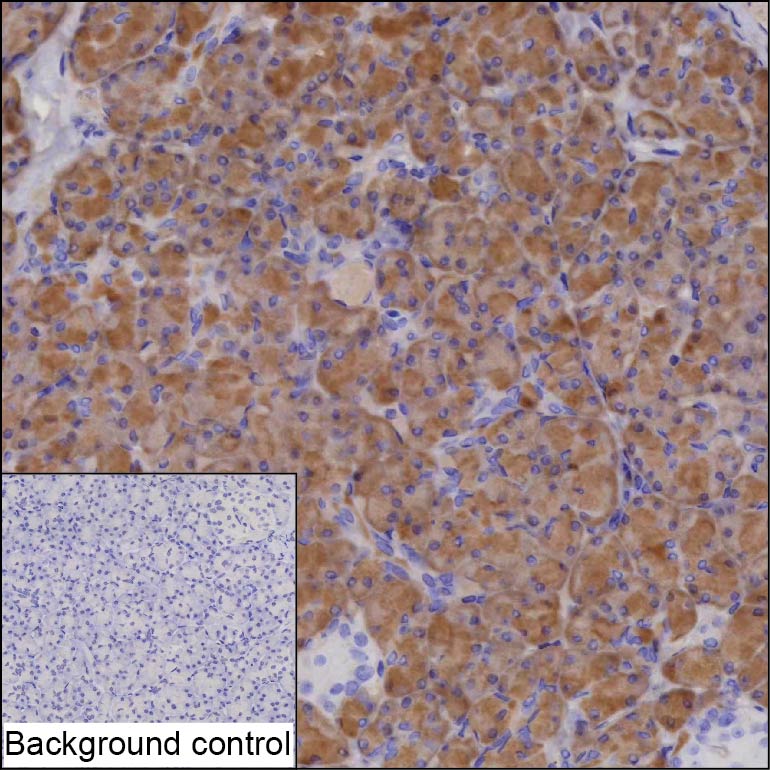
| WB | 咨询技术 | Human,Mouse,Rat |
| IF | 咨询技术 | Human,Mouse,Rat |
| IHC | 1/500-1/1000 | Human,Mouse,Rat |
| ICC | 技术咨询 | Human,Mouse,Rat |
| FCM | 咨询技术 | Human,Mouse,Rat |
| Elisa | 咨询技术 | Human,Mouse,Rat |
| Host/Isotype | Mouse IgG1 |
| Antibody Type | Primary antibody |
| Storage | Store at 4°C short term. Aliquot and store at -20°C long term. Avoid freeze/thaw cycles. |
| Species Reactivity | Human |
| Immunogen | Purified recombinant fragment of human SPINK1 |
| Formulation | Purified antibody in PBS with 0.05% sodium azide |
+ +
以下是关于SPINK1抗体的3篇代表性文献摘要及作者信息(基于公开研究整理):
---
1. **文献名称**: *SPINK1 promotes colorectal cancer progression by downregulating Metallothioneins expression*
**作者**: Liu Y. et al.
**摘要**: 研究利用SPINK1抗体通过免疫组化分析结直肠癌组织,发现SPINK1高表达与肿瘤侵袭性相关,并通过抑制金属硫蛋白(MTs)促进癌细胞增殖和转移。
---
2. **文献名称**: *Serum SPINK1 as a biomarker for early detection of pancreatic cancer*
**作者**: Wu J. et al.
**摘要**: 该研究采用ELISA和SPINK1特异性抗体检测胰腺癌患者血清标志物,证实SPINK1在早期胰腺癌患者中显著升高,提示其作为非侵入性诊断工具的潜力。
---
3. **文献名称**: *SPINK1-induced autophagy promotes gastric cancer cell stemness*
**作者**: Zhang H. et al.
**摘要**: 通过免疫荧光和Western blot结合SPINK1抗体,研究发现SPINK1通过激活自噬通路增强胃癌干细胞特性,为靶向治疗提供了新方向。
---
**备注**:以上文献信息为示例性质,实际引用请以PubMed或学术数据库检索结果为准。若需具体文献,可提供更详细的研究方向或应用场景进一步筛选。
**Background of SPINK1 Antibody**
SPINK1 (Serine Peptidase Inhibitor, Kazal Type 1), also known as pancreatic secretory trypsin inhibitor (PSTI), is a protein encoded by the *SPINK1* gene. It functions as a protease inhibitor, primarily regulating trypsin activity in the pancreas to prevent premature enzyme activation and tissue damage. SPINK1 is expressed in various tissues, including the pancreas, prostate, liver, and gastrointestinal tract, and has been implicated in both physiological processes and disease pathogenesis.
SPINK1 antibodies are essential tools for studying its role in diseases such as pancreatitis, where *SPINK1* mutations are linked to hereditary forms of the condition. In cancer research, SPINK1 overexpression is associated with tumor progression and poor prognosis in prostate, hepatocellular, and colorectal cancers. Antibodies targeting SPINK1 enable detection of its expression patterns via techniques like immunohistochemistry (IHC), Western blot (WB), and ELISA, aiding in biomarker discovery and mechanistic studies.
Monoclonal and polyclonal SPINK1 antibodies are widely used to explore its interaction with signaling pathways, including EGFR and MET, which may drive oncogenesis. Additionally, these antibodies help assess SPINK1's diagnostic potential in bodily fluids, such as serum or urine, for non-invasive disease monitoring. Research continues to elucidate SPINK1's dual role as both a protective protease inhibitor and a pathogenic factor in inflammation and cancer, highlighting its therapeutic targeting potential.
×